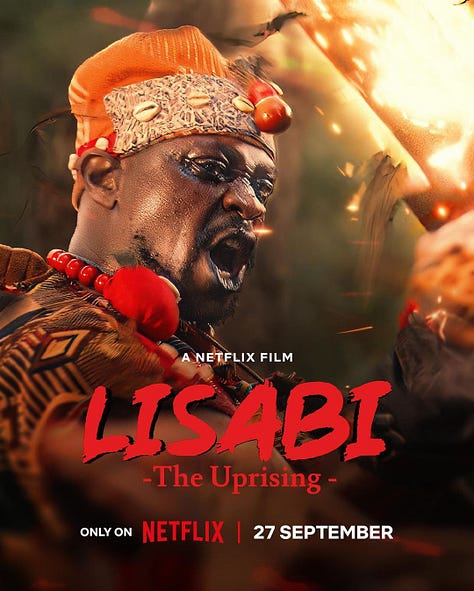"Lisabi: The Uprising" Delivers an Epic Experience—Another One For the History Books
... that's if you can overlook the rushed ending weighed down by poor CGI and visual effects.
Setting the mood before getting down to business is crucial in life—whether it’s sex, studying, heading into a meeting, or, in this case, storytelling. Lisabi: The Uprising sticks to this age-old principle. Its first 10 minutes tell a self-contained story that sets the stage for everything to come. In this opening, we meet a man (Femi Adebayo), bloodied and dragged into a palace to face the all-powerful Alaafin (Odunlade Adekola), a figure we're more than familiar with in these epic tales that have become a mainstay in present-day Nollywood. The Alaafin is the supreme leader of the Yoruba people, and while this fact is well-known in the real world, Lisabi: The Uprising takes its time to re-establish it in the cinematic universe we've just entered.
This Alaafin’s cruelty is made known within minutes when he orders the death of Adebayo’s character, who we find out is also a king, albeit a smaller one. In the same breath, it also introduces Ibrahim Chatta’s brutish Sangodeyi, a key player in the forthcoming crisis—because what's a Yoruba epic without a clash of ideologies leading to a poetic brawl? This is one of many other elements, like the recycled cast, that continue to make all these movies feel similar in DNA and commentary.
Lisabi: The Uprising is also based on a real-life figure in Egbaland and follows the titular character played by Lateef Adedimeji, a farmer who wants nothing more than to continue to live his quiet life far from the Alaafin’s Tribute Collectors' cruelty towards his people. That’s his core— a simple man trying to lead a simple life. But as with all heroes, he soon learns an important lesson: you can't ignore evil because it’ll eventually find its way to your doorstep. Before this realization, we get glimpses of the man Lisabi is destined to become. One such moment occurs when he encounters the young girl child of the village’s local bar dealer, at this point now a victim of the Alaafin’s goons' atrocities. Heartbroken and enraged, Lisabi questions what more Oyo could possibly want from them. It’s a question he’ll be forced to confront head-on when tragedy strikes closer to home.
If there’s one thing Lisabi: The Uprising does well, it's building tension. The story starts slowly and moves deliberately, especially with its two-part structure. Netflix loves its two-parters, but it’s rare to see their originals that truly benefit from this release strategy. Most times, it feels like a cash grab to extend media coverage. However, Lisabi starts off using this format to its advantage: it lays a strong foundation and establishes its characters with care. After Lisabi experiences his personal tragedy, the story really takes off.
The performances are okay across the board, and Lateef Adedimeji shines as its lead. It’s no surprise—he’s a natural in these epic roles having done them one too many times. While he can do comedy, there’s something about seeing him in intense, emotionally charged characters that feels so immersive. He delivered in Jagun Jagun, which this movie feels like a spiritual successor to, and continues his streak here. However, at this point, I’d love to see him take on a different kind of challenge in front of the camera—something more dramatic and intense away from epic settings. Perhaps a contemporary drama that relies purely on emotional intensity without the crutch of historical grandeur or action would do the trick. It would be exciting to see him explore the depths of more intimate, character-driven narratives.
That said, he’s okay to watch in Lisabi: The Uprising, even if it treads familiar ground for him. Ibrahim Chatta also deserves a mention. He’s been a consistent face in Yoruba epics for years, long before streaming platforms glamorized the genre. Watching him navigate this world feels like home, and his performance, as always, doesn’t disappoint.
Lisabi: The Uprising triumphs on many fronts, but it also stumbles as the story begins to wind down. As it approaches the finish line, the film veers into intense fantastical territory that seemed to come out of nowhere and it suffers heavily in the reliance on CGI to bring these elements to life. The story could have creatively sidestepped much of this reliance on CGI, reserving it for only the exceptional moments that truly warranted it. This would have reduced the animators' workload and given them more time to refine the visuals. The final act also suffers from a sense of urgency, particularly during Lisabi's confrontation with Sangodeyi. Until that point, the pacing had been smooth, with each event flowing naturally into the next. Suddenly, however, Lisabi's plan is hurriedly unveiled, and the climactic showdown between hero and villain is rushed through so quickly that you might miss it if you blink.
In many ways, Lisabi: The Uprising deserves a pat on the back for what it gets right. From its commitment to building a world steeped in history and culture, the film delivers a rich and immersive experience. The careful pacing in the first two-thirds, along with its decent sense of character motivations, create a solid foundation for what could be an exciting franchise. However, by the time it reaches its conclusion, Lisabi: The Uprising falters in tying things off into a neat enough bow that closes things here and sets up enough excitement for its sequel, scheduled for a January 2025 release. Though a few minor story threads remain, its most significant plotlines are wrapped up too quickly, leaving little to look forward to. The film seems to run out of steam just when it should be building momentum, ending with an abruptness that feels like a missed opportunity. Still, I’ll be watching in January — and hoping it sticks the landing.
Rinzy’s Rating: 3/5
Directed by: Niyi Akinmolayan
Written by: Niyi Akinmolayan and Yinka Olaoye
Starring: Lateef Adedimeji, Adebowale “Mr. Macaroni” Adedayo, Ibrahim Chatta, Odunlade Adekola, Roseline “Liquorose” Afije, and many more.













